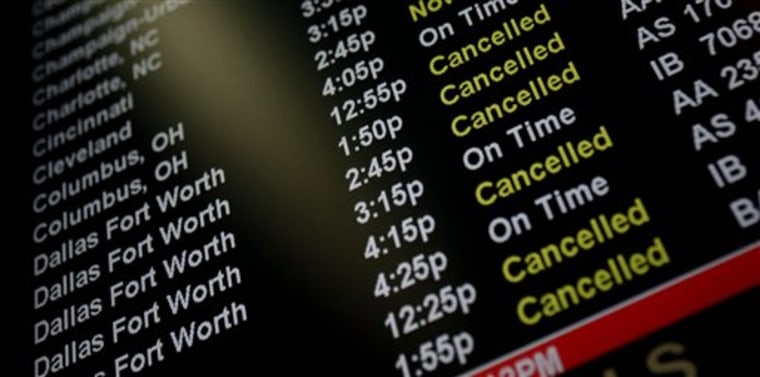It's not just angry passengers who are suffering. The grounding of thousands of flights is disrupting cargo, mail and other crucial business for financially strapped airlines, and that means painful new strains on a U.S. economy teetering on the edge of recession.
Apologetic airlines suggest the cancellations won't extend beyond this weekend. But there are indications the problems may just be beginning as federal regulators step up their scrutiny of carriers' compliance with safety rules.
Air traffic systems, computers and other crucial equipment are aging, as are many of the planes themselves. Critics of the industry say that cutbacks on maintenance and inadequate government safeguards are starting to take a toll.
Meanwhile, record-high jet fuel prices have squeezed airlines and led to a new round of bankruptcies — most recently Frontier, ATA Airlines, Skybus and Aloha Airgroup — in an industry whose finances have always been shaky.
After the Sept. 11, 2001, terror attacks, Congress authorized $5 billion in cash to help shore up the industry and followed up with $10 billion in loan guarantees. The industry now is suffering its hardest times since then.
Delays already were costing the economy an estimated $9 billion a year, according to Sen. Charles Schumer, D-N.Y., chairman of the Joint Economic Committee of Congress. "The U.S. economy can't afford to have one of its major airlines just shut down for days," he said Thursday. "The ripple effect is tremendous, it's like putting a vise on commerce."
American Airlines canceled more than 900 flights on Thursday and 570 for Friday because of wiring repairs. That brings to more than 3,000 the number of flights scrubbed since Tuesday when federal regulators warned that nearly half the airline’s planes might violate a safety regulation designed to prevent fires.
That, plus safety-inspection cancellations this month by Delta, Midwest and other airlines left hundreds of thousands of passengers scrambling for alternatives and drew outbursts from Capitol Hill.
"It's catastrophic economically, and it's an embarrassment to the nation," said Sen. Jay Rockefeller, D-W.Va., chairman of a Senate Commerce subcommittee on aviation safety. That panel grilled officials from the Federal Aviation Administration and airline industry groups on Thursday.
Nicholas Sabatini, associate FAA administrator for safety, said that, as disruptive as the cancellations might be, everybody should be grateful that "we're not here post-accident, but at a time when the system is incredibly safe."
"The airline industry is living on borrowed time," Rockerfeller said.
Sen. Frank Lautenberg, D-N.J., said, "Some may argue it's one of the safest periods. But it's happened in spite of FAA policies. We've seen record flight delays, increases in near collisions on our runways, understaffing of controllers and safety inspectors." He also claimed lax enforcement by the regulatory agency, an allegation Sabatini denied.
Manufacturers rely on airlines to deliver tons of cargo a day, and any lengthy period of mass cancellations could prove costly. The groundings also are taking a financial toll on business travelers who lost a day or more of work, and on people in the airline industry such as flight crews idled by the groundings.
"I really had no idea this thing could drag on as long as it has. A week and a half ago, I thought it was a one-time thing," said Steven G. Cochrane, senior managing director of Moody's Energy.com.
He said the groundings could have a "moderate impact" on the overall economy and directly affect the balance sheets of the airlines involved. "Their margins are so thin right now. There's no wiggle room for the airlines. Anything that provides any kind of a speed bump is going to put them into a loss."
For one thing, Cochrane said airlines no longer are able to hedge successfully against rising fuel costs. In the past, they could enter into fixed-price contracts when prices were fluctuating that gave them some protection against increases. "No one out there now is willing to agree to provide them fuel in the future at today's prices. The risks are all on the upside on price," he said.
Airline analyst Ray Neidl of Calyon Securities said the rise this week in oil prices to over a record $110 a barrel is potentially more damaging to airline finances than the FAA groundings. Still, he acknowledged that if the groundings go on for a "long time, it's going to cause overall general economic problems." He said he was optimistic that the problems would turn out to be short-term ones.
U.S. airlines transport more than 2.1 million passengers on a typical day, directly employ over a half million workers, provide extensive cargo services, link U.S. cities with each other and with the rest of the world and "are the backbone of the travel and tourism industry," said Basil Barimo, vice president of the Air Transport Association of America, an industry trade group.
"The U.S. airline industry is not simply an important sector of our national economy. Its services fuel our entire economy," Barimo said. "Air transportation is an indispensable element of America's infrastructure and our nation's economic well-being."
The intensified inspections that resulted in the wide-ranging groundings were ordered by the FAA after Southwest Airlines was found last month to have flown planes that missed inspections.
Darryl Jenkins, an analyst who teaches airline management at Embry Riddle Aeronautical University in Daytona Beach, Fla., said he didn't think it was necessary "to ground an entire fleet and inconvenience hundreds of thousands of people" when many of the inspections and maintenance jobs could have been done at night. He accused the FAA of swinging back and forth between being too cozy with the airline industry and being too rigid.
